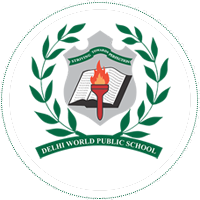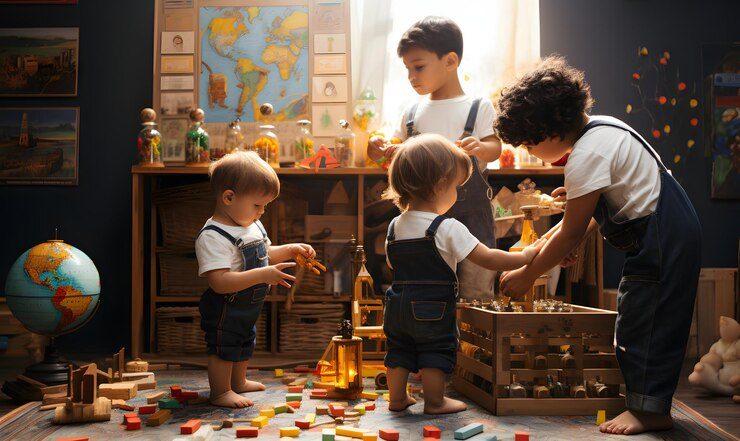Introduction
Early childhood education is a pivotal stage in the developmental journey of a child, setting the foundation for lifelong learning and growth. Delhi World Public School, nestled in the educational hub and renowned as Best International School in Greater Noida, takes a unique and playful approach to early childhood education. This article explores how the school blends traditional teaching methods with innovative play-based learning to create a nurturing and effective early educational environment.
Philosophy Behind Playful Learning
The School believes that learning should be joyous and engaging, especially in the formative years. The school’s philosophy is rooted in the understanding that young children learn best in environments where they can explore, discover, and play.
- Child-Centric Approach: The curriculum is designed around the child’s natural curiosity and innate desire to learn through play. It focuses on fostering personal, social, emotional, and intellectual development, recognizing that these early years are crucial for setting a positive trajectory for lifelong education.
- Incorporating Play in Learning: Each classroom at the School is a haven of educational toys, interactive materials, and creative resources. These tools are not just for play but are integrated into learning experiences that teach language, math, science, and social studies in an engaging and age-appropriate manner.
Collaboration with International Schools
The School frequently collaborates with renowned international schools in Greater Noida to share best practices, resources, and innovations in early childhood education. These collaborations enrich the school’s approach and ensure it remains at the cutting edge of educational developments.
- Global Best Practices: Through partnerships, the school incorporates global best practices in early childhood education into its curriculum. This includes adopting international pedagogical approaches such as the Reggio Emilia approach, which emphasizes self-directed, experiential learning in a relationship-driven environment.
- Cultural Exchange Programs: The school organizes cultural exchange programs with its international partners, exposing students to diverse cultures and global perspectives from an early age. This not only enhances their learning experience but also fosters a sense of global citizenship.
Innovative Learning Environments
The learning environments at the School are meticulously designed to stimulate and support the various developmental stages of young learners.
- Interactive Classrooms: Classrooms are equipped with smart technology, tactile learning materials, and flexible furniture, all designed to support an interactive learning experience. This setup encourages children to move, explore, and engage with their surroundings, enhancing their motor skills and cognitive development.
- Outdoor Learning Spaces: Recognizing the importance of outdoor play, the school features safe and stimulating outdoor learning environments. These spaces include nature gardens, playgrounds, and sports facilities, where children can learn through physical activity and interaction with the natural world.
Holistic Development Focus
School’s early childhood program goes beyond academic skills, placing a strong emphasis on the holistic development of each child.
- Emotional and Social Development: The curriculum includes structured activities that promote emotional intelligence and social skills, such as cooperative games, storytelling sessions, and role-playing. These activities help children learn empathy, conflict resolution, and teamwork.
- Physical and Health Education: Physical development is also a key component of the curriculum, with daily activities designed to improve fine and gross motor skills. Nutritional education and healthy eating habits are promoted through school meal plans and cooking classes.
Parental Involvement and Community Engagement
A critical aspect of the early childhood program at School is the active involvement of parents and the community.
- Parental Workshops and Seminars: The school hosts regular workshops and seminars for parents, offering them tools and knowledge to support their children’s education at home. Topics include understanding child development, enhancing home learning environments, and managing behavioral challenges.
- Community Participation Events: The school organizes events where the community can engage with students’ learning journeys. These include arts and crafts fairs, musical performances, and sports days, which not only showcase the children’s skills but also build a supportive and engaged school community.
Continuous Assessment and Personalized Learning
The School emphasizes the importance of continuous assessment and personalized learning in early childhood education. Recognizing that each child is unique, the school implements strategies to cater to individual learning styles and paces.
- Individualized Learning Plans: Teachers at School develop individualized learning plans for each child, based on their interests, strengths, and areas for improvement. These plans ensure that every student receives the attention and resources they need to thrive.
- Progress Tracking: Continuous monitoring and assessment of each child’s development allows teachers to adjust teaching methods and learning activities accordingly. This dynamic approach helps maintain engagement and ensures that educational activities remain effective and relevant.
Integration of Technology in Early Learning
In an age where technology is ubiquitous, introducing young children to technology in a controlled and educational way can provide them with a head start. The School integrates age-appropriate technology into the early childhood curriculum, ensuring that children become digitally literate from an early age.
- Educational Apps and Tools: The school utilizes tablets and computers equipped with educational apps and software that reinforce learning concepts through interactive games and activities. These digital tools are chosen carefully to ensure they are developmentally appropriate and enhance learning rather than distract from it.
- Technology-Enhanced Interactivity: Interactive whiteboards and digital storytelling tools are used to make learning sessions more engaging. These technologies allow children to interact directly with learning materials, deepening their understanding and retention of information.
Focus on Creative Arts
Understanding the role of creativity in cognitive development, the School incorporates a strong arts program into its early childhood education curriculum, encouraging expression and imagination.
- Art and Music Integrated Learning: Activities in art, music, and drama are not only fun for children but are also used as mediums to teach mathematics, literacy, and social studies. This approach helps children make connections between different areas of learning and express their understanding creatively.
- Exposure to Multicultural Art Forms: By introducing children to a variety of art forms from around the world, the school promotes cultural appreciation and broadens students’ perspectives. These activities are aligned with the school’s international collaborations, providing a global context to art education.
Conclusion
Delhi World Public School, Good School in Greater Noida, which is a playful approach to early childhood education is a model of how innovative, child-centric teaching methods can profoundly impact young learners’ development. By integrating play-based learning with structured educational outcomes and leveraging international collaborations, the school ensures its students have the best start to their educational journey. As the children grow and move on to more advanced stages of education, the foundation laid during these early years at the School will continue to support their academic success and personal growth, preparing them to meet the challenges of the future with confidence and creativity.

